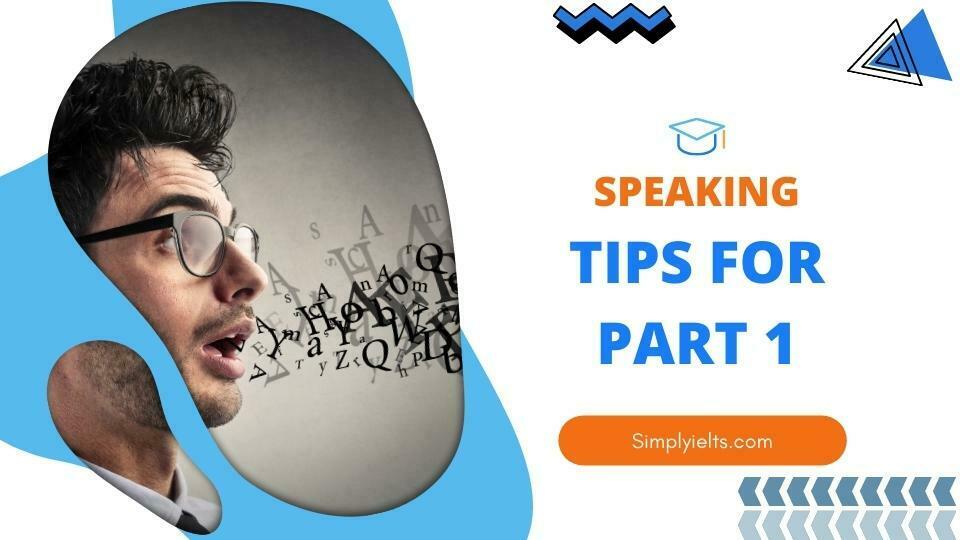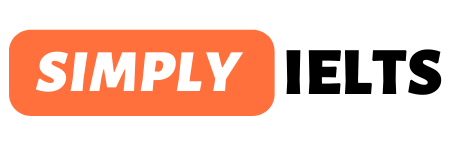Tips for IELTS Speaking Part 1

Tips for IELTS Speaking Part 1 – IELTS Speaking Part 1 is the most straightforward sections in the Speaking interview.
Here, the IELTS examiner will introduce themselves and then ask approximately 10 questions about you and your surroundings.
You must sufficiently answer them in 1 to 4 sentences without getting distracted. When you enter the examination room you need not shake hands but surely should greet the interviewer.
Tips to perform well on IELTS Speaking Part 1
- Recognise what the question is asking you precisely.
- Once you have recognised the question well, you should answer the question directly. The direct answer assures the examiner that the examinee has understood the problem well.
- After addressing the question directly, offer relevant one or two points with an explanation.
- Use 1 to 4 sentences to answer the questions on IELTS Speaking Part 1.
- Ensure that the ideas in your answers are well connected.
Before we move any further let’s answer a few commonly asked questions about the beginning of the IELTS Speaking test.
Should I shake hands with the IELTS Speaking interviewer?
You may shake hands with the IELTS Speaking examiner. However, don’t impose yourself on the person, especially in the pandemic. You may avoid it altogether.
How should I greet the IELTS Speaking examiner?
Well, you may simply greet according to the time of the day. In morning say good morning and so on. Don’t bother to tell your name here. As a formality, they are going to ask you your full name once you take the seat.
Introduce yourself
How can I introduce myself to IELTS Speaking examiner?
Firstly, not many IELTS Speaking examiners will ask you to introduce yourself. And even if they do, don’t give an answer that you offer in a job interview. If you want to introduce yourself, you may use the following four points to form 4 sentences.
- Name and town
- Immediate family members
- Profession
- Why IELTS?
For example, one may introduce themselves as follows.
“Hi, I am Rajeev Sharma from New Delhi, India. I live with my parents and an elder brother. I am a fresh Computer Engineer, and currently, I work with a local software firm. I want to study further in Canada, and so I am appearing for IELTS Academic.”
This answer is more than sufficient. You need not be too fancy or lengthy.
Sample questions on IELTS Speaking Part 1
Now, before I give any more tips on how IELTS Speaking Part 1, let’s look at some sample questions asked. We will also analyse students’ wrong answers and then find out what should be the ideal answers.
- Do you use computers?
- Did you use computers when you were little?
- How important is the Internet to you?
- Do you use the Internet more for work or in your free time?
I am sure all these questions seem very simple, and you are wondering why am I learning about these questions at all. However, I can guarantee that most students cannot answer these questions as well as they think.
Let’s begin with them one by one.
Q1. Do you use computers?
Now, this seems like a common question. Right? Here are a few sample answers given by some students.
A wrong answer to Q1:
“Well, computers are needed everywhere nowadays. And they are used for different purposes by different people. However, I usually use it to play games.”
What is wrong here? The student is asked, do you use computers are not. But the student doesn’t seem to satisfy the question at all. Consider another answer.
Another wrong answer to Q1:
“Yes, I am always so excited to use computers. It makes my life easy. And whenever I have any complex task to do, I use my computer.”
Okay. This seems to be a bit of improvement. The student at least said that whether he or she uses the computer or not. But the rest of the answer is too vague and seems like filler.
So, what should be the actual answer? Well, consider the following response.
A good answer to Q1:
“Yes. Computers are a must for my line of work. As a creative writer/ blogger/ video editor, it is mandatory for me to own and use a computer. Additionally, they also come in handy for watching tv shows in beautiful resolutions.”
Tip 1: Recognise what the question on Speaking Part 1 is asking.
The student clearly understands the question and states whether he or she uses the computer daily or not. And then he or she gives a couple of well defined examples to state how they use the computer.
You may give a negative answer.
At the same time, you may answer this question negatively as well. You need not worry that you must say yes. Many professionals may not need computers daily. If you are one of those people, then you could say
Another good answer to Q1:
“No, as I am a dancer, I need not use a computer daily. However, I use my smartphone to check my emails or social media, few tasks which I used to perform using a computer earlier.”
You may notice the student doesn’t stop by denying but explains why they don’t use the computer nowadays.
Q2. Did you use computers when you were little?
Again this seems to be a simple question. Still, many students mess up this answer as well.
A bad answer to Q1:
“When I was a child I used to play a lot of cricket on the ground. We friends used to visit cafes where we played some video games. I think the computers were not that popular at that time.”
Now, it is clear that the student has understood the question but cannot put a well-defined answer together. It is essential to realise that this is the second question on your IELTS Speaking test.
On Part 1 of the speaking test, if you answer these simple questions like this, your impression on the examiner will be poor. And probably the examiner may get biased while judging you in the rest of the exam. So, be specific and to the point while answering these questions.
Consider the following answer.
A good answer to Q2:
“No. when I was a child, computers were a luxury. I remember playing Solitaire on my father’s computer at his office once. But, apart from that, I never had my hands on any computer.”
Tip 2: Connect ideas while answering questions on IELTS Speaking Part 1
In this answer, the student displays clarity and connectivity in ideas. The IELTS Speaking interviewer will understand whether the student used the computer as a child or not and why.
Now, let’s move on to the next question.
Q3 How important is the Internet to you?
A bad answer to Q3:
“Well, the internet today is like a lifeline for everyone. Many people use it for their work, education or even entertainment. Some even use it to connect with others using social media. So, I also use it to send my office emails or check out current news.”
Tip 3: Don’t use introductions to answers on IELTS Speaking Part 1
Now, I know many of you are wondering why is this a wrong answer. Well, think about it. Your IELTS Speaking test will be over within a maximum of 14 minutes. On Speaking Part 1 and Part 3, you will be asked about 16 questions. And about 3 minutes are spent on Part 2. Effectively, the examiner has only 10 minutes to ask 16 questions and listen to their answers. That is effectively 45 seconds to ask questions and get answers.
As seen in the given answer, if you start building background in about 3 to 4 sentences. The examiner may think that you have not understood the question at all. And they may cut you off abruptly after two sentences. If that happens, you cannot reach the actual answer. Instead, consider the following reply.
A good answer to Q3:
“As a writer and a blogger, the internet is critical to me. I use it to back up all my files as well as emails at work. Also, I edit some videos on it too using online tools.”
This answer is simple and answers the questions precisely.
Q4. Do you use the Internet more for work or in your free time?
A bad answer to Q4:
“Since I work 10 hours a day, I must say I use the internet for work. I am so tired after my job that I hardly have any energy to get on to the computer and work anything out.”
Now, you may say what is wrong with that answer? Well, reread the question. You are asked to compare the two situations. Unfortunately, the student, in his explanation, doesn’t compare the two circumstances. Consider the following answer.
A good answer to Q4:
“I use the internet equally for work and in my free time. I mostly blog and write articles while working. On the other hand, I watch films or YouTube videos to keep myself entertained during my free time. I also try to write personal blogs in my free time on important topics.”
You may see that you must present a comparison when you are asked to compare any two aspects as above.
Final tips for IELTS Speaking Part 1
Now that you have examined a few wrong and useful answers for the IELTS Speaking Part 1, let’s draw some conclusions.
- Identify what the question is asking you..
- Once you have understood the question, answer it directly.
- Don’t give unnecessary introductions to your answers.
- Elaborate your answer with one or two points.
- Restrict answers to 1 to 4 sentences.
- Your points must be well connected.
I hope you have realised how to tackle with IELTS Speaking Part 1





Responses